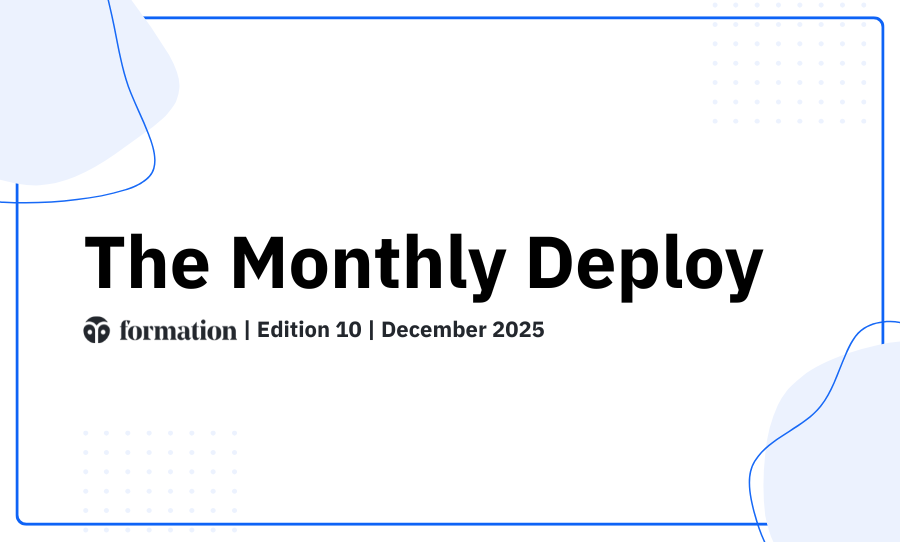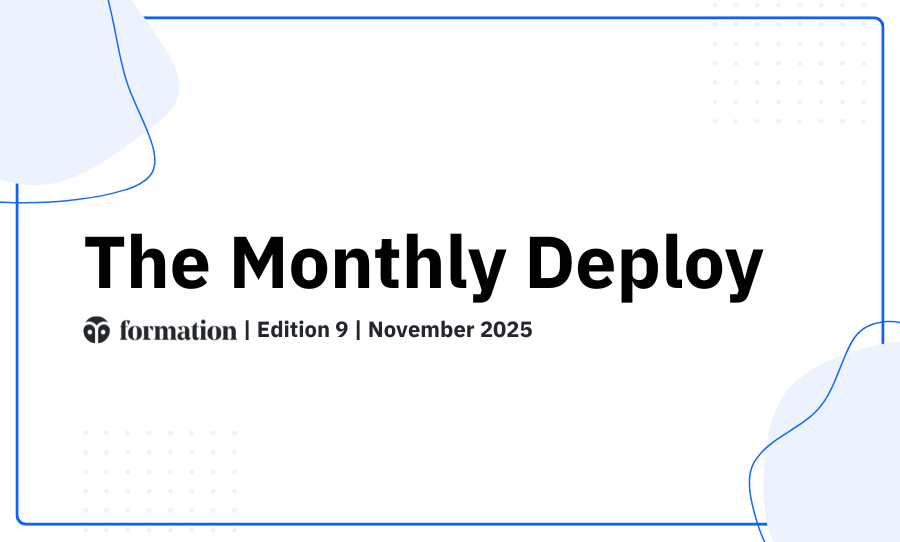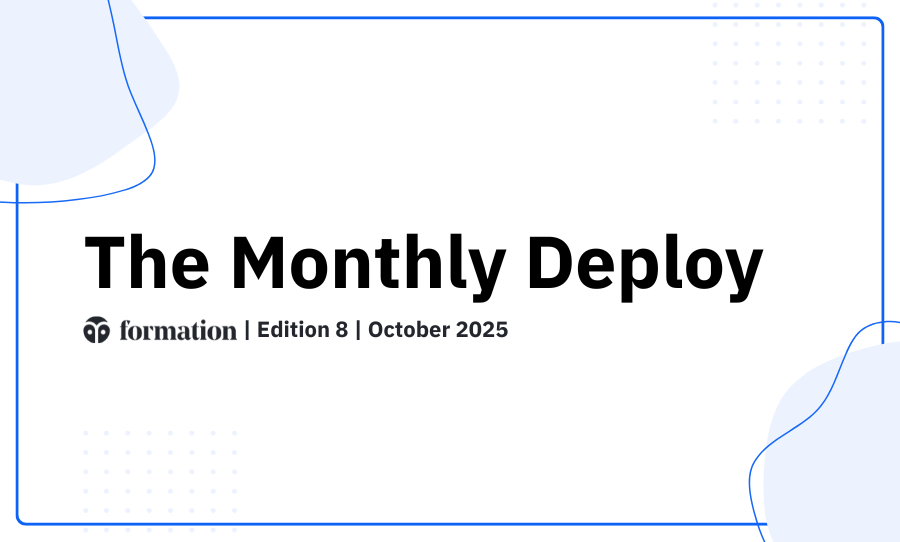Celebrating five years of Formation: A mission to diversify tech with Sophie and Michael Novati
As we celebrate Formation’s fifth anniversary, founders Sophie Novati and Michael Novati share their journey.
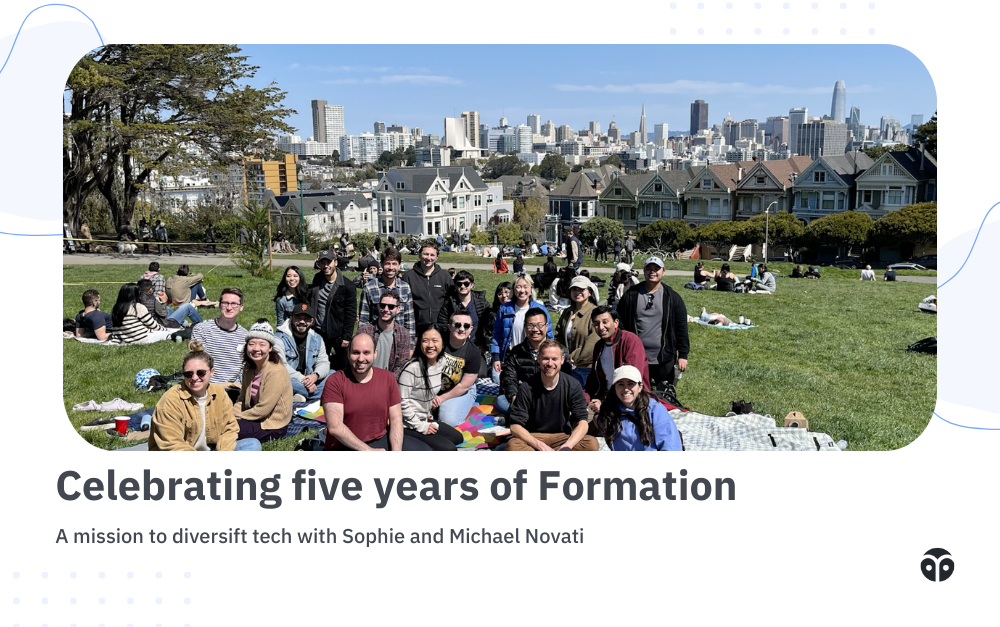
Five years ago, Formation started with a simple goal: diversify the tech industry and provide better economic opportunities for people from all backgrounds. As we celebrate Formation’s fifth anniversary, founders Sophie Novati and Michael Novati share their journey, the innovative methods that make Formation unique, the challenges they've faced, and the difference they've made in the tech world.
Can you both share a bit about yourselves and your backgrounds?
Sophie: I learned to code through a traditional educational path. I went to Carnegie Mellon, a well-known school for computer science. I landed a job at Facebook right after school and spent several years there. But when it came time to navigate the next steps of my career, I didn’t know what to do. Even after going to one of the best schools and being at one of the best companies in the world, my next job transition was not easy.
I thought that if this were this hard for me, it wouldn’t be easy for many other people from different backgrounds. When I was at Nextdoor, I worked to diversify the places where we found engineers. During that time, I discovered that what I suspected to be true was very much true—people from different backgrounds often were severely underprepared for the market and the teams I was interviewing for. I wanted to solve that problem.
Michael: I grew up in Canada and pursued a general engineering degree. I didn't know I wanted to do programming until my last year of college when I fell in love with web programming. I think the thing that I love about it is you get to save your code, refresh a page, and see what you just wrote live in front of you. During my time at Facebook, I was a very prolific code contributor because seeing people have delightful experiences using the things you're building is something that really drove me to keep shipping more and more and faster and faster.
I was always an IC at Facebook. I never managed people, but I did lots of interviews and mentorship. I really liked working with entry-level engineers and helping them make their way to mid-level at Facebook, which is a critical step for any entry-level engineer there—to make it to mid-level within a year of their job.
When I left Facebook, I started seeing some of those people I helped later in their careers. Seeing them as staff engineers, moving to different companies, and starting companies, I realized that helping people was the next thing I wanted to do for a long time. So that was my interest in starting Formation, which brought us here today.
How did Formation come to be, and what makes your approach unique?
Sophie: Formation started with the idea of providing personalized, hands-on mentorship. Initially, it was about doing the best job at teaching possible, adapting to each individual's unique needs. Over time, we developed an adaptive learning platform that benchmarks skills against market expectations and tailors the training to meet their individual goals. This personalized approach has been key to our success in placing people from diverse backgrounds into top tech companies. The idea of "personalization as caring at scale" became our guiding principle. We aim to meet each Fellow where they are, which has proven very effective.

How did you two decide to work on this venture together?
Michael: Formation evolved from a previous project called Buildschool, which Sophie ran. When we raised venture funding, we rebranded and expanded our vision. The flexibility of our technology allows us to continuously adapt to the market and deliver personalized mentorship, which has been crucial, especially during the shift to remote learning brought on by COVID-19.
Sophie initially ran Buildschool on her own, and I helped out with accounting and mentoring. After we raised venture funding, I joined full-time, driven by the vision of helping people navigate their careers. It wasn't a planned decision; it evolved organically as we saw the potential impact we could have.
What were some of the biggest challenges you faced in the early days of Formation?
Michael: One significant challenge was figuring out what exactly we were doing. We knew we wanted to help software engineers land better roles, but the specific product wasn’t clear initially. The COVID-19 pandemic also forced us to transition from in-person to fully remote, changing how we delivered our services. This shift ultimately allowed us to offer more flexible and accessible mentorship sessions.
Sophie: Another challenge was raising venture capital without clearly understanding the process. We had to iterate and learn quickly, adapting to the market's needs and figuring out how to differentiate ourselves from competitors.
What has been your proudest moment so far?
Sophie: Our proudest moments are tied to each successful placement we make. It feels incredibly rewarding whenever we help someone land a job, especially those from non-traditional backgrounds. Seeing the significant increases in compensation and the life-changing impact on our Fellows makes all the hard work worthwhile.
Michael: Agreed. I'm also particularly proud of Sophie’s growth as a business leader. Seeing her pitch to top VCs and close our funding rounds has been a testament to her determination and ability to learn and adapt. She didn’t start out knowing how to run a business, and she’s figured it out.
What are some of the biggest lessons you’ve learned as founders?
Sophie: One of the key lessons is the importance of a sustainable business model. It's easy to build a company that offers great services at a loss, but to have a lasting impact, the business model must work. We’ve had to balance delivering value to Fellows while ensuring our pricing and payment terms make sense for the individuals and the business. Even the idea of charging someone something to help them was honestly weird to me. But, I realized that to have the scale of impact we want, we are responsible for creating a business model that works. So, creating a win-win situation where we can deliver value and figure out how to create pricing and payment terms that make sense for the Fellow and the business is something I’ve had to learn to do.
Michael: I’ve learned that running a company is much more than just building a product. It involves managing a team, handling logistics, branding, and many other aspects. The founders are entirely responsible for ensuring that nothing falls through the cracks. If all you want to do is build a really great product, being a founder might not be the best fit. You have to want to build a really great product and do all the other things, too.
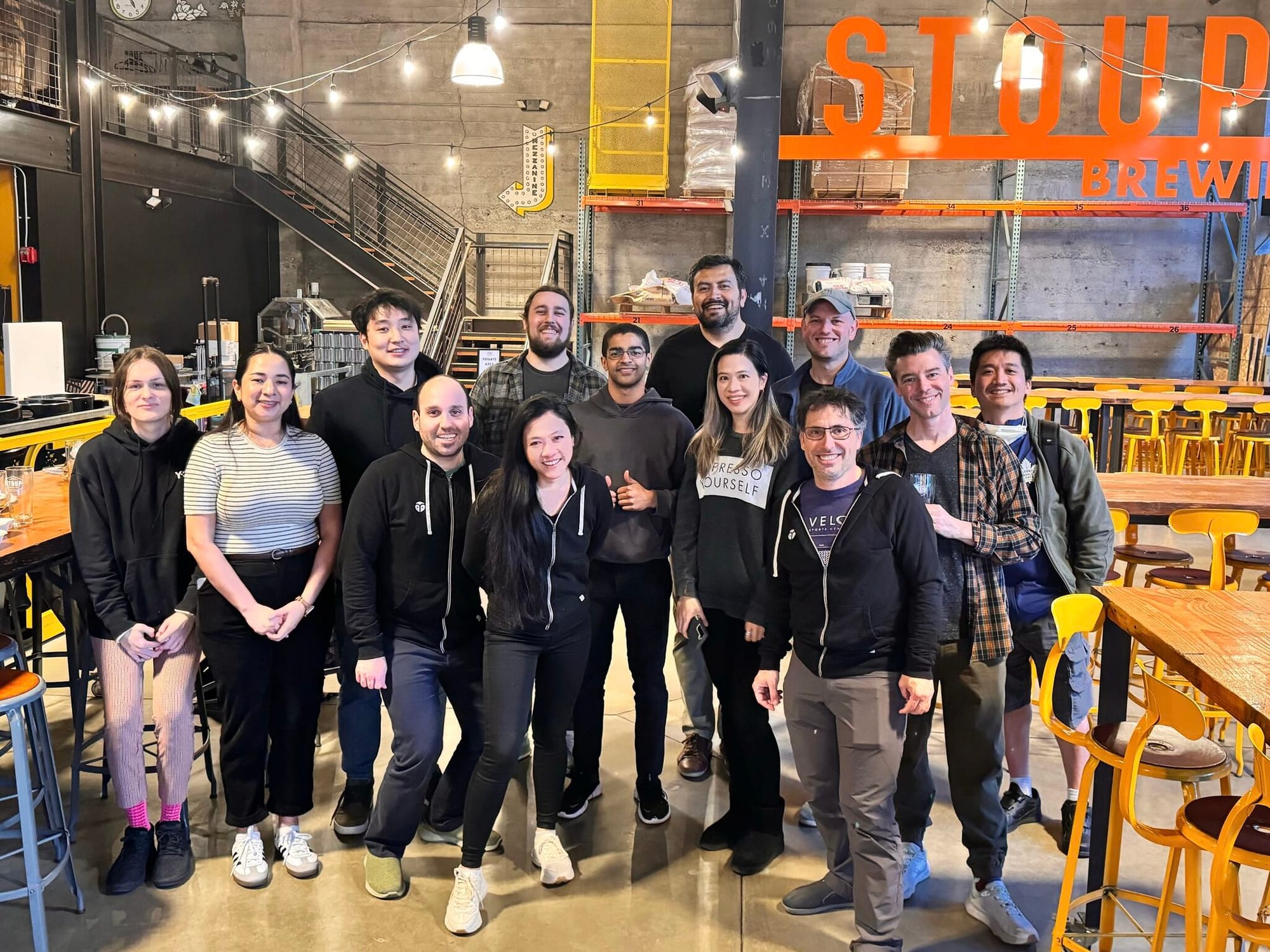
How have you approached building a strong company culture at Formation?
Sophie: Our mission-driven focus has been key to attracting and retaining a cohesive, high-performing team. We give smart people interesting problems to solve and the autonomy to have a significant impact. Those are the ingredients to creating a team that will be cohesive because we're all high-performing and driven by the same mission.
Michael: Our mission is central to everything we do. The total collective compensation of individuals coming into Formation is about $25 million annually. When we look at the first-year total compensation for people leaving Formation, it's around $50 million annually. This means Formation has generated an additional $25 million into peoples’ pockets. We’re impacting individual lives and the economy as a whole. That’s our north star. When our team sees their impact on people, it motivates them to go the extra mile. They might reply to an additional message or do that extra thing not because it's their job but because they know it's genuinely helping someone.
How has the changing landscape of the tech industry affected Formation, and how have you adapted?
Sophie: Now, there's a greater emphasis on senior-level skills, and we’ve adapted our platform to focus more on systems design and hiring manager interviews. We’ve also identified new market segments, shifting our focus from entry-level roles to mid to senior-level engineers who need more specialized support.
The bar has been raised with everything across the board. People just have to be ready. They have to really be hitting their mark. And that makes our job, on average, a little bit harder, but it also increases the value we deliver to our users because, in this market, people just need to be better prepared and need a little more support. And that's something that we offer. Our core model has always been that we support you for as long as needed to get a job. In this current market, where things are very uncertain, I think people value that because they don't know exactly how long they will need it, and we're here with them until they succeed.
Michael: Our technology allows us to adapt quickly to these changes, offering flexible mentorship and training that aligns with the current market demands. We couldn’t be as agile as we are without the technology we have. We’re able to adapt this way because of how we built our product, and that’s been absolutely crucial to staying relevant and effective in a constantly evolving industry.
What are your future goals for Formation in the next five years?
Sophie: I would say today, we're still super focused on our very targeted niche of mid- to senior-level software engineers. Over the next five years, we will have to evolve constantly as the market evolves. But I can also see us expanding beyond software engineering. The technology we built is fundamentally agnostic to whatever subject matter we teach.
I think the rate of the different skills needed on the market will be increasing, which means that people will need more and more continued education, training, and support throughout their careers. Eventually, that will translate into regular cycles of work and periods of time when you're reinvesting in your skills.
Michael: I think one thing to add is how crucial it is to help people find the right company for them. There's an ideal match for everyone, and this isn't just about getting into an elite group of companies or selecting people with so-called magical potential. Many programs and bootcamps focus on placing individuals into these top companies, but we at Formation want to help everyone find their right path and the steps that make them truly happy.
Our goal is to support individuals in a way that goes beyond just their skills. We consider whatever they want, whether it’s work-life balance or other factors. We aim to be there for them throughout their careers, encouraging them to return to us in two years for their next step. It's about fostering lifelong relationships and helping people at every stage of their professional journey.

